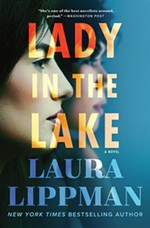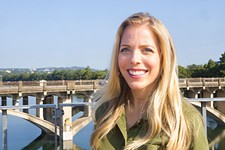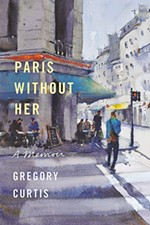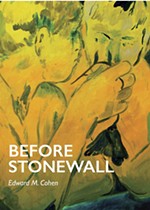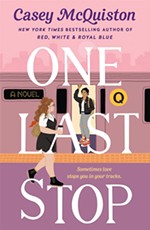Minerva Koenig on South of Nowhere
The Austin-based crime fiction writer wanted her mystery series to show how someone becomes a sleuth
By Rosalind Faires, Fri., Feb. 26, 2016
In the infamous detective story setup, a broad walks into the office, and you wonder how she got there. I mean, sure, you wonder about the crime she's about to tell you about – how her husband did her wrong, how her jewels went missing, how she hasn't heard from her sister in three months – but most of all you wonder about that peculiar convergence of time and place and coincidence that makes up a person's life and leads them to a particular moment.
Minerva Koenig has her own unexpected path to where she is today. An architect by trade, Koenig originally came to Austin as a University of Texas art student (then a theatre student, then an English student, then an art student again) and couldn't help but stay after graduation. Her foray into the world of the hardboiled detective came out of a 2008 lull in architecture work. Her lifelong love of literature turned into four years spent crafting a debut novel, Nine Days, which introduced her heroine, Julia Kalas, to the world.
Now Koenig has brought Julia back for more detecting in South of Nowhere, which she will read from and speak about alongside fellow crime author, Trudy Nan Boyce, at BookPeople on Friday, Feb. 26, at 7pm. Koenig was kind enough to meet up at one of her favorite writing haunts – the lobby of the Driskill Hotel – to answer some questions about how you solve your own mysteries.
Austin Chronicle: There's this rich and specific sense of Texas in both your first novel, Nine Days, and its sequel, South of Nowhere, and that's certainly something that I'm enchanted by.
Minerva Koenig: I think of Texas as a character in the books. And I think that's something you have to live here to appreciate because people who are not from Texas – I have read books that are set in Texas, and you can almost tell that the writer doesn't live here because they have a sort of cornpone, cowboy-hat-boots-and-snakes idea. And the fascinating thing about living here: It's almost like it's still a frontier place in a way. Texans are very unique in the way they treat strangers. They're not really stand-offish, they're not really Western, they're not really Southern. I really love the landscape of Texas. I like it hot and dry. That suits me personally. Being able to write about it, it's like, why would you ever set anything anywhere else? And I wanted to put a stranger in it – [Julia, the protagonist of Nine Days and South of Nowhere] is not from Texas, and you get to see her reaction: "What the hell is that thing?" "Oh, now I understand why people wear cowboy boots." That sort of thing.
AC: That speaks to a directive in how you created your heroine. Your website says that one of your day jobs is fighting the patriarchy ....
MK: I want to see characters in books for whom femininity is not an issue. And it's one of the things that drove me to write [Nine Days]. I read a lot of murder mysteries; I pick them up, and the femininity of the heroine just slaps you in the face – she talks about what she wears, how she wears her hair, how she exercises and keeps herself in shape, all this stuff. I just wanted a woman who was just a person. I got so frustrated reading female characters in books that I personally could not relate to. I know a lot of girly-girls, but I also know a lot of women who just don't care about that stuff, and they deserve to have a voice in the canon.
The other thing that always drove me crazy about murder mystery sleuths is that a lot of times you come into the story and they're already a detective. And you can tell they're tough and that they have some baggage, but you don't really know what it is. I wanted to write about someone evolving into a detective instead of just coming into it, you know? Where she's sitting behind the desk, feet up, waiting for her client. Which is very classic! It's a classic way to start a murder mystery, but I was more interested in how people evolve. What makes somebody become a private detective? It's such a [laughs] weird thing to do! You don't just walk down the street and meet private detectives every day – I think I've only met one in my life.
AC: I feel like the question that everyone who doesn't write specifically for the mystery genre is, what's the approach –
MK: How do you figure it all out?
AC: Yeah, because it requires so much more structure than a loose-form novel.
MK: Yeah, I think that's probably why my first book took me four years. Because I didn't do a lot of planning. With South of Nowhere, I wrote a synopsis, which was kind of like a mini-novel – I just wrote it in narrative form – and I could write a paragraph and think, "Oh, this happens, then this happens, then this happens, oh yeah, then this will happen and this will happen! [laughs] I'll write on the synopsis until I get stuck, and then I'll go to the manuscript until I get stuck, and then I'll go to the synopsis to figure out what happens next." It's kind of like a give and take. I'm a looper thinker – I don't think in straight lines, I keep coming back to things and refining and refining. And I think that's why I like the novel form. Because it's a lot of opportunities to do that.
AC: Can you tell me anything about the third book in the series?
MK: It picks up immediately where South of Nowhere left off. The third book is going to be about – well, you know what? [laughs] I'm not entirely sure what it'll be about. But in addition to watching Julia evolve from a criminal to a detective, I'm also watching her evolve from crusty broad to a more nuanced and compassionate person. And so she's going through that process in this book, and it's going to be tricky.







